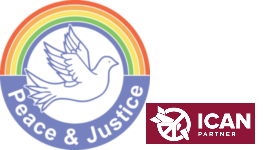
You-Ri Yamanaka in The Mistake
The Mistake, The Priest’s Tale, The Doctor’s Tale
Review by Annie Mae Milburn
This month marks 75 years since the US dropped two atomic bombs on Japan on the 6th and 9th of August 1945. To mark the respective anniversaries of Hiroshima and Nagasaki, two recent plays by Michael Mears have beautifully brought to life survivor accounts from each city, exploring the real depth of human suffering caused by the bombings. Recorded at Sands Films studio in London, the plays are now available to view online for free with the option to give a donation to support the performers, venue and the Campaign for Nuclear Disarmament.
Performed on August 6th, The Priest’s Tale explores the story of a German Jesuit priest living in Hiroshima and his experience of the bombing and its subsequent repercussions. An adaptation of one of the survivor accounts in John Hersey’s book Hiroshima, Michael Mears gives an excellent and heartfelt portrayal of Father Wilhelm, accompanied with live violin music by Chihiro Ono.
Following this on August 9th was a production of The Doctor’s Tale, adapted from the book Nagasaki 1945 by Tatsuichiro Akizuki. Performed by Leo Ashizawa with support from Michael Mears and again music from Chihiro Ono, the play follows Akizuki’s experience working in a small hospital when the bomb hit Nagasaki and trying to carry out his duty of care during the aftermath with a small team and extremely limited supplies.
The simple staging of these two plays emphasizes the narrative itself, allowing the audience to truly focus on the characters at hand and engage with the weight of their trauma. Chihiro Ono’s violin interludes add a beautiful musical backdrop, interspersing the story and periodically allowing the viewer a moment of melancholy pause to sit with and digest the complexity and struggle of the narrative. Mears succeeds in bringing to life the experience of everyday citizens in the face of such unimaginable horror, forcing us to reckon with the awful human cost of the bombings.
Alongside the unspeakable tragedy that forms the basis of both performances, however, is a hopeful note in how the characters and their communities organise themselves after the bomb hits to try and help in any way that they can. Dealing not only with the immediate aftermath of the bombings but also Japan’s subsequent surrender, ending the war, and the burgeoning mystery of radiation sickness, the performances are effective at conveying the full gravity of the attacks and their enduring consequences.
As part of the Edinburgh Peace & Justice Centre’s Peace Cranes project, The Mistake is a new play chronicling several people – ‘the survivor, the scientist and the soldier’ – and their experience with the bombing of Hiroshima. Directed by Jatinda Vermer and performed by Michael Mears and You-Ri Yamanaka, the play uses testimonies and eye witness accounts to entwine the stories of these three characters and their different roles in the tragedy.
Unfortunately delayed due to COVID-19, The Mistake is now planned to open in August 2021 at the Edinburgh Fringe Festival. However, on August 22nd as part of Just Festival’s 2020 programme, an online event provided a sneak preview of the play through a video collage of rehearsal film and images. The video was followed by a post-show Q&A session featuring Michael Mears, You-Ri Yamanaka and Peace Cranes exhibition curator Iliyana Nedkova. Watch the entire event on the Just Festival YouTube channel here.
Moving away from the single survivor story format of The Priest’s Tale and The Doctor’s Tale, The Mistake embraces multiple character perspectives to give a broader flavour of the different experiences and political undertones surrounding the terrible events in Hiroshima.
The video montage provided an introduction to each of the characters: Shigeko Nomura, a Japanese woman living in Hiroshima during the war, Leo Szilard, a physicist integral to the discovery of nuclear chain reaction and the subsequent commencement of the Manhattan Project, and the American pilot tasked with dropping the bomb, Paul Tibbets.
The addition of the Q&A session allowed Mears to go into detail about his thought processes and research behind the script, setting up an excellent background for the play. Some may be unfamiliar with less well-known actors involved in the making and deployment of the bomb, such as Leo Szilard, so the event also provided a deeper discussion of the historical context surrounding Hiroshima.
Whilst Mears himself has not visited Hiroshima, Yamanaka discussed her first trip to the city earlier this year and how it affected her. She provided poignant insight by describing her thoughts as she disembarked the train and walked around the city, marveling at the extent of what has been rebuilt in only 75 years.
The session ends on a thoughtful note as Nedkova queries how contemporary art and theatre might be able to contribute to uncovering more about the cultural legacy of Hiroshima and the bombing. This prompts a thoughtful discussion about the relative merits of theatre versus television and film, and whether or not reaching as many people as possible is really the ultimate true measure of success.
As the future of in-person theatre remains somewhat uncertain for the time being, these three events have creatively shown how projects can adapt and evolve with the help of technology. Here’s hoping that The Mistake will be able to reach its intended audiences at the Edinburgh Fringe Festival and beyond next year.
Click here to Watch The Priest’s Tale on Vimeo.
Click here to watch The Doctor’s Tale on Vimeo, anytime.
Click here to watch The Mistake event on Just Festival’s YouTube channel.
Annie Mae Milburn is a graduate on a work placement with the P&J and is currently Editor of Peace & Justice News.

